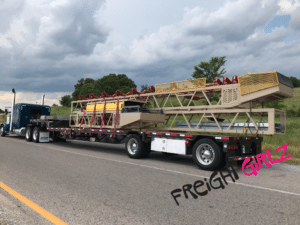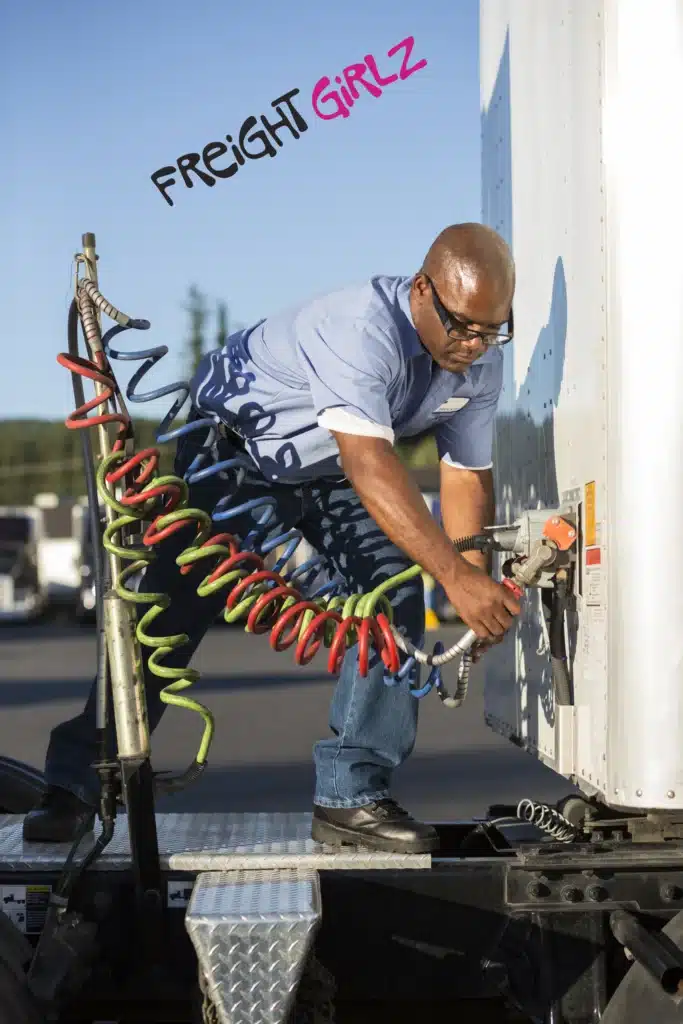The sweet spot in the trucking industry is the benefit of a dispatcher. A dispatcher holds the responsibility to work for carriers, not just to find them loads but to find the best paying freight. It’s in the dispatcher’s best interest to get the highest paying loads since they are taking a percentage of the load. A good dispatcher knows that the more the carrier makes on every load the more the dispatcher’s percentage would be. Taking cheap freight for a dispatcher is counterintuitive to the success of the driver and the dispatcher. The driver will not succeed and will no longer use the services of a dispatcher nor will either party make good money on the load. Secondly, taking cheap freight also brings down the industry as a whole. A dispatcher of professionalism and principle knows they also have a responsibility to the industry they work within and low paying loads brings down the rate for all in the trucking industry.

Step Deck dispatched by Freight Girlz
For brokers it’s advantageous to be able to have good relationships with dispatchers as they have access to capacity and drivers that the broker needs to move their loads and keep their customers (the shippers) happy. Brokers are always seeking different equipment types needed to move their freight, but also by qualified drivers that are reliable and in good standing. Dispatchers have the resources to accommodate this with a broker and become an asset to them instead of spot market posting or regular drivers that are unavailable to them.
From a carrier standpoint having a good dispatcher creates the road map to growth and effective management in their schedule. A driver can spend hours searching and calling on available freight instead of over the road actually making money. A dispatcher allows them to drive while he/she finds and books their next load. A dispatch service also frees the driver from making several phone calls to brokers where negotiating the rate becomes tedious. A well-seasoned dispatcher knows where the rate needs to be (not only for the driver) but within market conditions and can use this skill to get a fair, if not better than market average, rate for the load.

Heavy Hauler Truck RGN
For many fleet managers and carriers, the onboarding process with a broker can be a time-consuming amount of paperwork. Left in the hands of an experienced dispatcher they can take the burden of the onboarding process and open up the needed time to the driver or owner/manager to concentrate on larger business needs. An effective dispatcher will also then sign the rate confirmations and be able to simply communicate the load details to the driver allowing them a single point of contact to keep the truck moving.
Once a driver is over the road under the freight that has been found, negotiated, onboarded and rate con signed that dispatcher is there for the carrier through the length of the pick-up and delivery of the load. A dedicated dispatcher will be able to communicate with the broker if issues arise during transit or if the driver is waiting to be unloaded and work for detention, lumper fees or problems at the point of delivery.
The dispatcher has a unique but critically supportive role in the trucking industry. It can bridge a needed gap between brokers and carriers to create a more seamless process within the supply chain. A dispatcher helps in keeping an eye on the goal of growth and success for carriers and provide additional fulfillment for brokers. Dispatchers also help drivers manage their HOS and have their finger on the pulse of safety, regulatory compliance and DOT inspections. A dispatcher is always monitoring unsavory or unprofessional business practices which make them a consultant and advisor to carriers and brokers alike.
Not everyone within the trucking industry will need a dispatcher, but for those that use a dispatching service they have the unique gift of having a brother or sister ‘over the road’ and a business partner that can foster their continued journey to ‘keep on truckin’.
Find your best dispatcher, consultant, advocate and chief partner for your truck at
Abby Barros | SUPPORT SPECIALIST



